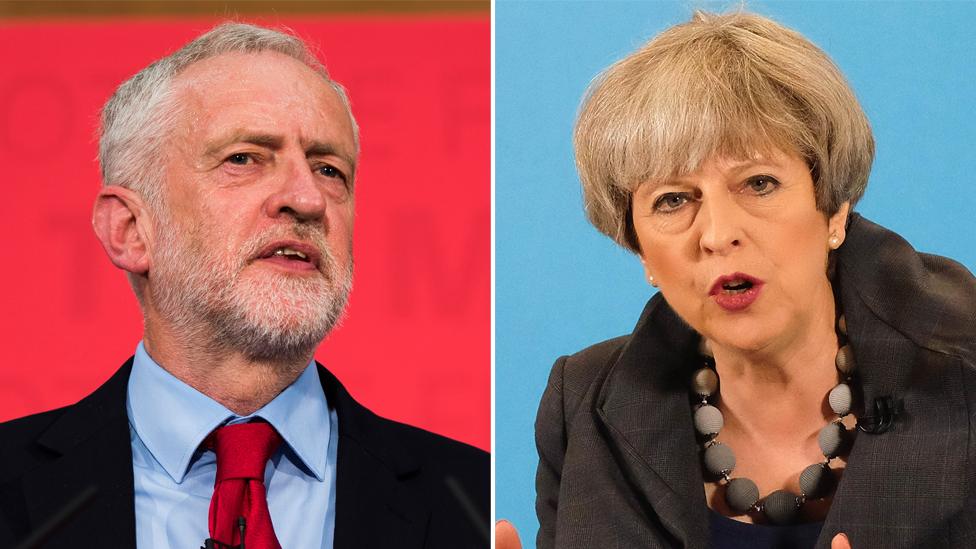How many Labour MPs will vote for Theresa May's Brexit deal?
- Published

The former US President Lyndon Baines Johnson said the first rule of politics is being able to count.
And looking at the numbers in the Commons Theresa May must wonder how on earth she can get a Brexit deal through Parliament, even if she breaks the impasse in Brussels.
As it stands, Tory Brexiteers say they have dozens of MPs ready to vote against the emerging deal.
The DUP's 10 MPs are incandescent about the current proposals for the Irish border and may be tempted to join them.
And crucially, Labour has six tests to judge any Brexit deal by which the government seems certain to fail.
The Labour leadership's strategy is to vote against the Brexit deal in the hope a general election will follow.
If it doesn't, Jeremy Corbyn says "all options are on the table" and several of his MPs believe at that point another referendum will come into play.
However, a split is emerging on the Labour backbenches which may prove vitally important in the final vote on the Brexit deal.
In an interview for the World at One on Radio 4, Labour MP Gareth Snell warned his party not to be the "midwife" of a no-deal Brexit.

Gareth Snell: The Labour Party has to be very careful
Mr Snell represents part of Stoke-on-Trent that voted overwhelmingly to leave the EU and is adamant the party must honour its manifesto promise to leave the EU.
"I don't think that we should dismiss at this point supporting any deal just because it is coming from the government," said Mr Snell.
"I think the Labour Party has to be very careful that we are not unwittingly becoming the midwife to a no-deal Brexit baby, if by voting down the deal that comes forward the only alternative is crashing out next March with a no-deal."
Mr Snell's view follows comments on Sunday by Labour MP Caroline Flint, who asked "if a reasonable deal is on the table, the question for my Labour colleagues is why wouldn't you support a deal?".
I understand the issue was raised at a meeting of the Parliamentary Labour Party last Monday and conversations are certainly going on between Labour MPs.

Ben Bradshaw is hoping for another referendum
The big question of course is how many Labour MPs might be tempted to vote for a Brexit deal or abstain - in defiance of the party?
And would they balance out the number of Tories who seem likely to vote against the government?
At the moment, that seems very unlikely.
Eight Labour MPs told the BBC, off the record, they would consider voting for the deal brought back to the Commons.
Since that deal is not nailed down, the numbers are fluid.
But if it contains a plan to keep the EU and UK economically close after Brexit (yet still falls short of Labour's six tests) the opposition might start to fracture - particularly if the vote occurs in December or January, with time almost up.
Add in the handful of Labour Brexiteers and these would potentially be very useful recruits for the government.
But other Labour MPs are appalled at the prospect some of their number might vote for the deal emerging in Brussels.
Ben Bradshaw said fellow Labour MPs should not fall what he called Theresa May's "false choice" between the deal on the table or nothing at all.
"There is no obligation on Labour MPs to vote for a deal they know will hurt their constituents, make them poorer, particularly some of those heartland leave - Labour constituencies that will be most badly affected by a hard Brexit or a no-deal Brexit," he said.
Mr Bradshaw's hope is that in the political chaos that would follow the Commons rejecting the deal, Parliament would swing behind calls for another referendum.
The looming vote on any Brexit deal will be momentous.
The outcome is impossible to predict, so too the ramifications of it being rejected.
MPs will wrestle with conscience, party instruction, their constituents' views and the referendum result.
There will be unlikely alliances in the division lobbies and the decision of just a few MPs could make a big difference.
So in the coming weeks, listen carefully to Labour MPs representing constituencies in the party's midland and northern heartlands that voted decisively to leave. The government's whips certainly will be.